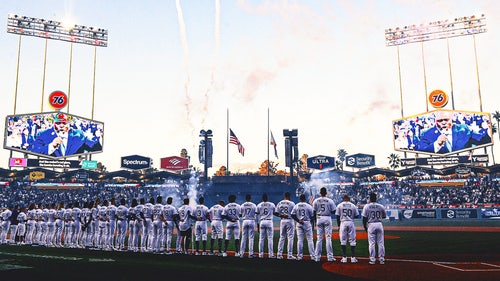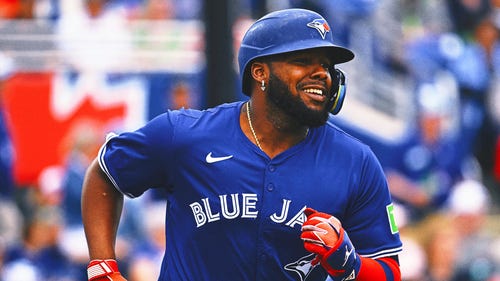
So, if true, what should the punishment be?
One reason that “Up and In” was a great baseball podcast is that they had a foreign affairs correspondent. It was an unofficial thing, of course, but Lincoln Mitchell served as the show’s expert voice on things like the debt crisis, the protests (and progress?) in the Middle East, and politics in general. Mitchell is a professor and political consultant by trade, and a published author, and Kevin Goldstein, naturally, fell in love with the guy.
This doesn’t come directly from Mitchell; it’s an anecdote about an anecdote. Sue me. On a particular episode (I can’t remember which; I recommend you listen to all 102 of them just to make sure you find it), Goldstein was recounting an off-air conversation he had with Mitchell, in which Mitchell mentioned a frequent point of disagreement between himself and most of the people on whom he relied for any internal information about governmental decisions or developments. It boiled down to this: Tons of information about the workings of Congress, governmental agencies, international bodies, everything, is classified and closely guarded. Many pundits, especially those with an agenda to push, make it a point to leverage the information asymmetry between themselves and the public whenever they’re discussing an unpopular or hotly contested development.
The thing is, according to Mitchell, most of the information on which these people place an extraordinary premium is intuitive, widely known, or unbelievably insignificant. Secret information that truly determines the advisability of one course of action or another is extremely rare, at least in the worlds of politics, international diplomacy, and macroeconomics. People on the inside worry way too much about small or even imaginary informational advantages.
Kevin didn’t believe that to be the case when it came to baseball. He placed significant value on what we, the outsiders and the common fans, don’t see and don’t know. (I’m putting these things in the past tense, so as not to attempt to characterize his current opinions. Maybe they’ve changed!) To quote Joe Sheehan (who was writing at this web address years before Kevin, and nearly two decades before me), “there aren’t secret baseball games going on.” I’m of the belief that, while there are certainly trade secrets worth keeping and a wealth of knowledge about specific situations that teams have and I don’t, few of these pieces of information really change the way the game works. Teams didn’t know that some catchers were saving 40 runs per season with their pitch-framing materially sooner than the public did, and the majority of teams found out thanks to former BP author Mike Fast. Bill James knew that on-base percentage was the most important offensive statistic long before Billy Beane did, and it would be five or 10 years before Beane told Michael Lewis that. One of Kevin’s favorite questions to play with was just how great the information gap between insiders and outsiders is. My answer to that question is: awfully small. Specifically, it’s that teams and their employees have reams of information about every player that we’ll never know, but most of that information just doesn’t change the equation very much.
***
This is an important conversation to have right now, since Goldstein and Fast both work for the Houston Astros, and we now know (or think we know; it looks an awful lot like we know) that the Astros were victimized, raided for their proprietary and confidential information, by the Cardinals. There are several important questions the league needs to answer in its effort to find the right way to handle this situation. The first one is the efficacy of the alleged hack, and for my money, there’s not a ton there.
The other questions are, if anything, harder to answer. For instance: We don’t know whether this was the work of rogue interns or high-up Cardinals executives. In fact, the better evidence seems to suggest it was the former. If that’s so, is this a big deal?
If the only intention was to embarrass the Astros, and not to gain a competitive advantage, is that a mitigating factor?
How high up must the conspiracy rise, within the St. Louis organization, for the hammer to come whistling down?
In answer to those questions, I offer Kenesaw Mountain Landis. Like many historical figures, Landis is sometimes too celebrated, and sometimes too vilified. He was the first Commissioner of Major League Baseball, and that was a hell of a hard bill to fill. The game was fraught with poor labor relations, strife between teams and leagues, and (most dauntingly) the serious threat that gambling would overrun the game and rob it of any competitive integrity. That threat reached a fever pitch almost the moment Landis took over the league, when the Black Sox scandal came to light.
As most historical leaders have done in times of crisis, Landis chose decisive action over nuance, and used the public’s somewhat ill-informed sentiments as justification for those actions. He consolidated power by showing his strength, and built the confidence of his constituency by holding up a new hero for a new era, one free from the ugliness that plagued the teens. Thus, it was out with Joe Jackson, in with Babe Ruth, and onward toward the glorious future of the game, albeit at the expense of an opportunity to learn from its past. It wasn’t really a good resolution; it certainly wasn’t a just one. Given the spot he was in, though, I don’t fault Landis. He did what he thought was necessary.
There’s certainly no need for anyone in the Cardinals organization to be banned for life over this. Any and all consequences should be focused on the team, not the individuals involved, because these organizations don’t run on individual brain power. They run on ways of doing things, on protocols and best practices, and it doesn’t matter whether the Cardinals intentionally adopted illegal, subversive practices, or fostered them through neglect of oversight. In either case, the outcome is the same, and the outcome does threaten the competitive integrity of the game, even if that’s more true in terms of perception than in terms of reality.
No, no one needs to be singled out (by MLB; I’m not here to debate or speculate as to whether someone goes to jail behind this), but the response from Rob Manfred’s office needs to be serious. Baseball isn’t going to be hurt by this scandal; it might actually allow the league to lead SportsCenter even after training camp opens for the Eagles and Bills. The next scandal of the same kind will really shred it, though. That’s what the stewards of institutions like this one are always worried about: the next scandal. And they’re not wrong. A soft response to this encourages other teams to try whatever similar thing they’ve been wondering whether to try. It also makes the league look just terrible if anything in the same area code as this happens again.
It was ugly and unseemly when baseball railroaded the MLBPA and manipulated the federal government in its efforts to make examples of guys like Barry Bonds and Alex Rodriguez. Those were witch hunts, persecutions with personal consequences, and they reeked of hypocrisy. None of the same elements are present here. When team-on-team violations like this happen, the Commissioner has a lot of leeway. Manfred should use his to set a strong precedent, or the future of baseball will be peppered with teams trying similar stunts.
It took forever, partly because the union had to protect its members, and partly because some owners needed to get done profiting from PEDs before they got on board, but the league has arrived at the right solution to that problem: make the punishment so severe that taking the risk is an acceptable tradeoff. In other words, since a first-time positive test for PEDs now leads to an 80-game suspension, it’s not a league-wide scandal if a guy uses. He’s risking a lot to do it. He’s risking a ton. If that’s what he wants to do, let him. If he gets caught, he pays for it badly enough that no one can get mad at anyone but the user.
Manfred just has to measure out a response that reads neither as a slap on the wrist nor as a blow below the belt. Taking away a star player would be too much. Taking away a single international signing bonus slot would be too little. There’s a happy medium. The only really important things are that the Cardinals not feel like they were tarred and feathered at the end, and that fans believe a clear message was sent to cheaters.
I’ll make a recommendation, since I’m here. I think the team should be ineligible from the competitive-balance lottery for three years; lose their first draft pick in 2016; be disallowed from signing an international free agent for more than $300,000 in the next two signing periods; and pay a $1 million fine. That’s not draconian, but it materially punishes them, and blocks their avenues for working around the punishment. (For instance, without the provision about the international signings, the team could simply divert the resources they might have poured into the draft toward a bevy of high-end teenagers.)
To me, that should be the punishment, and it matters very little who did it, or why, or what degree of advantage one feels they gained from it. This should mostly be about what was actually done, and it seems clear that what was done was illegal and damaging to baseball. The rest of the questions, while interesting and ripe for debate, are only tangentially related to that central one.










